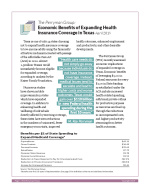Economic Benefits of Expanding Health Insurance Coverage in Texas
Published on March 29, 2019

Texas is one of only 14 states choosing not to expand health insurance coverage to low-income adults using the financially attractive mechanism created with passage of the Affordable Care Act (ACA) in 2010. Almost 1.5 million Texans would immediately become eligible for expanded coverage, according to analysis by the Kaiser Family Foundation.
"Health care needs do not simply go away because individuals do not have insurance coverage," said Dr. M. Ray Perryman, President and CEO of The Perryman Group, an economic research and analysis firm based in Texas. "Instead, medical issues tend to escalate and lead to higher costs and worse outcomes. Texas would gain over $110 billion in new Federal health spending during the first 10 years."
Numerous studies have shown notable improvements in states which have expanded coverage. In addition to enhancing health and wellbeing of individuals directly affected by receiving coverage, these states have seen reductions in the numbers of uninsured, fewer emergency room visits, improved health outcomes, enhanced employment and productivity, and other desirable developments.
The Perryman Group recently examined economic implications of expanded coverage in Texas. Economic benefits of leveraging $9.00 in Federal resources for every $1.00 in State funding as established under the ACA include increased health-related spending, additional private outlays for productive purposes as resources are freed up through the reductions in uncompensated care, and higher productivity stemming from better health outcomes.
"Expanded coverage in other states has yielded many benefits, including better performance and sustainability for rural hospitals and expanded resources to address the opioid crisis," said Dr. Perryman.
The Perryman Group estimates that during the first 10 years after implementation, the net economic benefits (fully adjusted for the alternative uses of the State contribution) of expanding coverage would include $319.2 billion (in 2019 dollars) in real gross product and almost 3.3 million job-years in Texas when multiplier effects are considered. For every dollar spent by the State for expanded insurance coverage, total net spending in the economy would go up by $69.11 and real gross product would rise by $34.49 over the first 10 years after implementation (including multiplier effects).
Though expanding coverage would increase Texas' direct spending, economic benefits would generate cost savings and estimated incremental tax receipts including over $19.5 billion to the State and more than $16.8 billion to local governments during the first 10 years after implementation. The Perryman Group found that for every dollar the State spends to expand health insurance coverage, $1.78 is returned in dynamic State government revenue, with $1.53 to local governments.
For more details please refer to the full report.
- Tags: insurance, healthcare